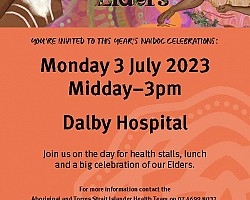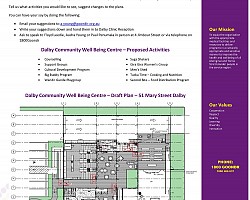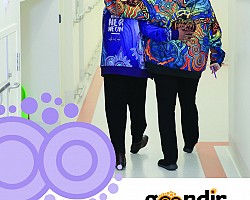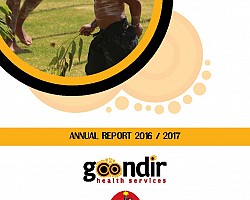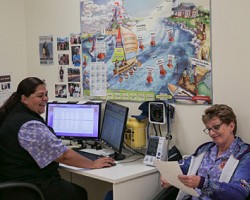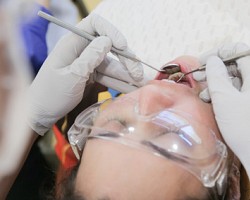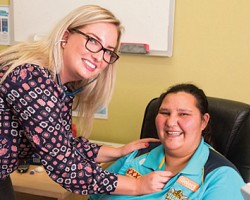Goondir Health Services is involved in a number of State and National research projects focusing on improving best practice in the primary prevention of communicable diseases. These partnerships represent a structured approach to improving services and programs through a quality improvement framework, recognising the potential application that the outcomes from these projects can have on primary care not only locally but at State and National level.
CURRENT RESEARCH PROJECTS
Research Excellence in Aboriginal Community Control Health (REACCH)
Since 2008 Goondir Health Services in partnership with National Aboriginal Community Health Organisation (NACCHO) and the Kirby Institute, is one of 5 Aboriginal and Torres Strait Islander Community Controlled Health Services sites participating in a nationally funded research project called Research Excellence in Aboriginal Community Control Health (REACCH). Goondir Health Services currently undertaking quality improvement activities focussing on Chlamydia a sexually transmissible infection with a particular interest in tracing the sequelae of sexually transmitted infection amongst clients between the ages 16 – 29. Specific activities currently underway; undertaking a clinical audit of patient records over the past ten years, surveying of clients and staff level of knowledge, identifying barriers to testing, treatment and follow up, facilitating professional development training and community capacity building and working towards publications of findings. All these activities will contribute to our understanding and knowledge towards building a comprehensive sexual health model for the Aboriginal and Torres Strait Islander people within this age population and broader application across the sector. This project is funded through NACCHO and concludes in 2014. For more information on this project please visit REACCH Project.
National Research Partnership to Improve Primary Health Care Performance and Outcomes for Indigenous peoples
AIM: To work with health service staff, management and policy makers to enhance the effective implementation of successful quality improvement strategies by exploring the factors associated with variation in clinical performance; supporting specific strategies that have been effective in improving primary care clinical performance.
The project will make use of the ABCD project tools and web-based information system which are now being supported by the National Centre for Quality Improvement in Indigenous Primary Health Care (One21seventy). Audit tools for Vascular and Metabolic Syndrome (ischaemic heart disease, high blood pressure and kidney disease), maternal health, child health, rheumatic heart disease and mental health are also available. Audit tools for health promotion, community food supply and community environmental health are under development and will be made available through One21seventy.
Partners: Menzies School of Health, One21Seventy, University of Queensland
Project period: August 2013 – August 2014
Validation and Implementation of Structured Clinical Interview for Diagnostic and Statistical Manual of Mental Disorders (SCID-I) tool to diagnose mental disorders in Indigenous Australians
The overall goal of this project is to understand the magnitude of the mental disorders and thus reduce the morbidity associated with mental health among Indigenous Australians. The main aims are: Validate SCID - I, Quantify the prevalence of mental illness amongst ATSI population with SCID - I and understanding and identifying the gaps in the evidence and the management of clients.
This study has two major parts to meet the aims of this study: (1)Administration of SCID-I to randomly selected clients within the participating AMSs; (2)Interviews with clients, health service providers and policy makers to identify, understand and close the gap.
Partners: UQ, Rural School of Medicine
Project Period: January/ February 2014 – December 2016
Minding the Gap - Evidence Based Management of Comorbid Mental and Physical Illnesses in Indigenous Australians: Indigenous Solutions to Indigenous Health Issues
Evaluate the relationship between mental illness and chronic disease amongst Indigenous Australians living in metropolitan, rural and remote areas, identify and understand gaps in evidence based management among Indigenous Australians and re design the Indigenous solutions/ models of care to address these gaps, compare health services utilisation between Indigenous and non-indigenous Australians, as captured by Queensland administrative health databases.
This study has four parts that complement each other to meet the aims and objectives: (1) A clinical audit based on medical record review of Indigenous participants with and without mental illness; (2) Interviews with patients and health care providers to understand the gaps; (3) Yarning circles to develop solutions to identified gaps; (4) A population-based data linkage study using administrative databases.
Partners: UQ, Rural School of Medicine
Project Period: January/ June 2014 – July/ December 2015
PAST RESEARCH PROJECTS
The Australian Collaboration for Chlamydia Enhanced Sentinel Surveillance (ACCESS)
From 2007 to 2009, Goondir Health Services in collaboration with the Burnett Institute and the National Aboriginal Community Health Organisation (NACCHO), participated in a funded trial of a new national sentinel surveillance system, entitled the Australian Collaboration for Chlamydia Enhanced Sentinel Surveillance (ACCESS). Goondir Health Services was one 5 clinic sites selected to participate in this project. Specific goals are to:
- assess the simplicity, flexibility, acceptability, timeliness, stability, validity, usefulness and representativeness of ACCESS
- assess the data quality of the system by examination of the first 12 months of data collection
- and make recommendations to improve the system.









